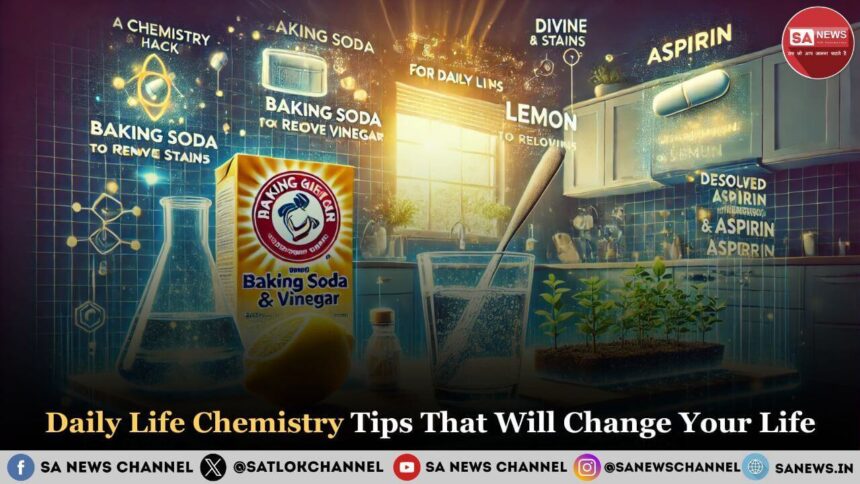Daily Life Chemistry Tips: Have you ever stopped to think about how science impacts your daily life? From the moment you wake up to the time you go to bed, chemistry is quietly working behind the scenes to make your life better. Whether it’s the medicine you take when you’re sick, the food you eat, or the soap you use to wash your hands, chemistry is everywhere.
In this blog, we’ll explore how chemistry plays a role in three key areas of your life: medicines, food, and cleaning products. Plus, we’ll dive into why chemistry is so important and how it’s shaping the future. Let’s get started!
1. Chemistry in Medicines: The Science of Feeling Better
When you’re feeling under the weather, you reach for medicine to help you feel better. But have you ever wondered how those tiny pills or syrups actually work? It’s all thanks to chemistry!
What Are Medicines Made Of?
Daily Life Chemistry Tips: Medicines are made up of chemicals called drugs. These drugs interact with your body to produce a specific effect, like reducing pain, fighting infections, or lowering fever. When a drug helps treat or prevent a disease, it’s called a medicine.
How Do Medicines Work?
Medicines work by targeting specific parts of your body, like enzymes or receptors. Here’s a quick breakdown:
- Enzymes: These are like tiny workers in your body that help chemical reactions happen. Some medicines stop enzymes from working, which can help treat diseases. For example, aspirin stops an enzyme that causes pain and inflammation.
- Receptors: These are like locks on the surface of your cells. Medicines can act as keys that either open the lock (agonists) or block it (antagonists). For example, cimetidine blocks a receptor in your stomach that produces acid, helping to treat heartburn.
Types of Medicines You Use Every Day
- Antacids: These neutralize stomach acid and help with heartburn. Examples include Tums and Rolaids.
- Antihistamines: These treat allergies by blocking histamine. Examples include Benadryl and Claritin.
- Painkillers: These relieve pain. Some are mild, like aspirin, while others are stronger, like morphine.
- Antibiotics: These kill bacteria and treat infections. Examples include penicillin and amoxicillin.
2. Chemistry in Food: From Farm to Fork
Daily Life Chemistry Tips: Chemistry isn’t just in medicines—it’s also in the food you eat every day. From preserving food to making it taste better, chemistry plays a huge role in your diet.
Why Are Chemicals Added to Food?
Chemicals are added to food for three main reasons:
- Preservation: To keep food fresh for longer.
- Taste and Appearance: To make food taste better and look more appealing.
- Nutrition: To add vitamins and minerals that your body needs.
Common Food Additives
- Food Colors: These make food look more attractive. For example, the bright orange color in your favorite cheese puffs.
- Flavors and Sweeteners: These make food taste better. Artificial sweeteners like saccharin and aspartame are used in diet foods.
- Preservatives: These prevent food from spoiling. Examples include sodium benzoate and sorbic acid.
- Antioxidants: These stop food from going bad due to oxygen. Examples include BHT and BHA.
Artificial Sweeteners: A Sweet Deal for Diabetics
Artificial sweeteners are chemicals that taste sweet but don’t have the calories of sugar. They’re great for people who need to watch their sugar intake, like diabetics. Some common ones are:
- Saccharin: Much sweeter than sugar and doesn’t add calories.
- Aspartame: Used in diet sodas but breaks down when heated.
- Sucralose: Made from sugar but doesn’t have calories and can be used in cooking.
3. Chemistry in Cleaning Products: The Science of Staying Clean
Daily Life Chemistry Tips: Cleaning products like soaps and detergents are another area where chemistry is essential. They help us keep our homes and bodies clean by removing dirt and germs.
How Do Soaps Work?
Soaps are made by mixing fats or oils with an alkali, like sodium hydroxide. This process is called saponification. Soaps work by breaking down grease and dirt, making it easy to wash them away with water.
However, soaps don’t work well in hard water (water with lots of minerals like calcium and magnesium). In hard water, soaps form a scum that sticks to surfaces instead of cleaning them.
What Are Synthetic Detergents?
Synthetic detergents are like soaps but work better in hard water. They’re made from chemicals and are divided into three types:
- Anionic Detergents: These are the most common and are used in laundry detergents and dishwashing liquids.
- Cationic Detergents: These have germ-killing properties and are used in fabric softeners and hair conditioners.
- Non-Ionic Detergents: These are gentle and used in liquid dishwashing detergents.
Environmental Impact of Detergents
One problem with detergents is that some of them don’t break down easily in the environment. This can lead to pollution in rivers and lakes. To solve this, scientists are developing biodegradable detergents that break down naturally and don’t harm the environment.
4. Why Is Chemistry So Important in Everyday Life?
Daily Life Chemistry Tips: Chemistry isn’t just a subject you learn in school; it’s a part of everything we do. Here’s why it’s so important:
Health and Medicine
Without chemistry, we wouldn’t have medicines to treat diseases or vaccines to prevent them. Chemistry helps us understand how our bodies work and how to fix them when something goes wrong.
Food and Nutrition
Chemistry helps us grow, preserve, and improve the quality of our food. It ensures that we have safe, nutritious, and tasty food to eat every day.
Also Read: Nobel Prize in Chemistry 2024 Awarded for Groundbreaking Work on Quantum Dots
Cleaning and Hygiene
Chemistry gives us soaps, detergents, and disinfectants that keep us clean and healthy. Without these, it would be much harder to prevent the spread of diseases.
Environment
Chemistry helps us protect the environment by developing cleaner fuels, biodegradable materials, and ways to clean up pollution. It’s essential for creating a sustainable future.
5. The Future of Chemistry: What’s Next?
Daily Life Chemistry Tips: Chemistry is constantly evolving, and it will continue to shape our lives in the future. Here are some exciting areas where chemistry is making a difference:
Personalized Medicine
In the future, medicines could be tailored to your specific genetic makeup. This means treatments will be more effective and have fewer side effects.
Sustainable Food Production
Chemistry will help us grow more food with fewer resources, like water and fertilizer. It will also help us create new ways to preserve food without harmful chemicals.
Clean Energy
Chemistry is at the heart of developing renewable energy sources like solar panels and hydrogen fuel cells. It will play a key role in reducing our reliance on fossil fuels.
Environmental Cleanup
Daily Life Chemistry Tips: Chemistry will help us clean up pollution and restore damaged ecosystems. From cleaning oil spills to removing plastic from the ocean, chemistry will be essential for protecting the planet.
Conclusion: Chemistry Is Everywhere!
Chemistry isn’t just something you learn in a lab—it’s a part of your everyday life. From the medicines that keep you healthy to the food you eat and the cleaning products you use, chemistry is working behind the scenes to make your life better. By understanding how chemistry works, you can appreciate the science behind the things you use every day and make better choices for your health and the environment.
So, the next time you take a pill, eat a meal, or wash your hands, remember that chemistry is the invisible force making it all possible. It’s not just a subject in a textbook—it’s a vital part of your everyday world!
Sant Rampal Ji Maharaj teaches that true knowledge (Satgyan) is the foundation for living a meaningful and harmonious life. His philosophy highlights the importance of recognizing the Supreme Power and following true spiritual principles for holistic well-being. This directly connects to how understanding the science of chemistry can transform daily life. Just as chemistry works behind the scenes to improve health, hygiene, and sustainability, Satgyan works within the individual to address inner conflicts, guide personal development, and create balance.
For instance, just as chemistry helps us stay clean through soaps and detergents, spiritual cleansing through true worship and moral living purifies one’s mind and soul. Similarly, chemistry ensures the safety and quality of food and medicines for physical health, while Satgyan provides wisdom to make ethical choices that nurture spiritual health. Sant Rampal Ji’s teachings advocate for a disciplined life where knowledge and actions are aligned, leading to true progress, much like how chemistry shapes a sustainable future.









